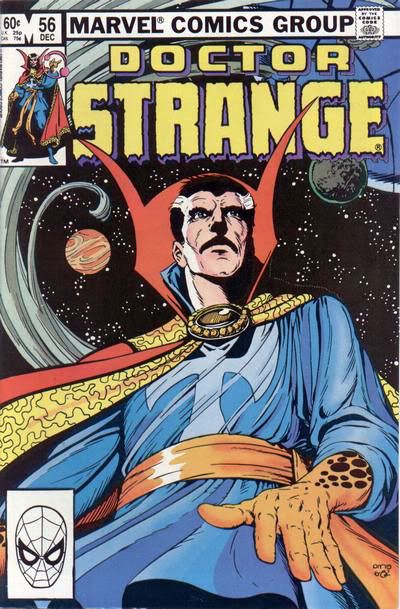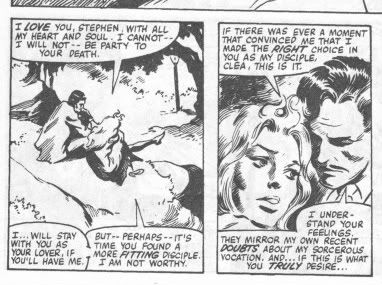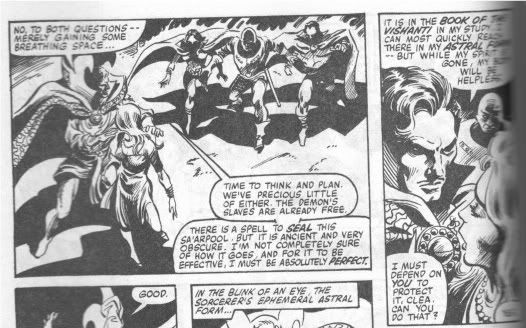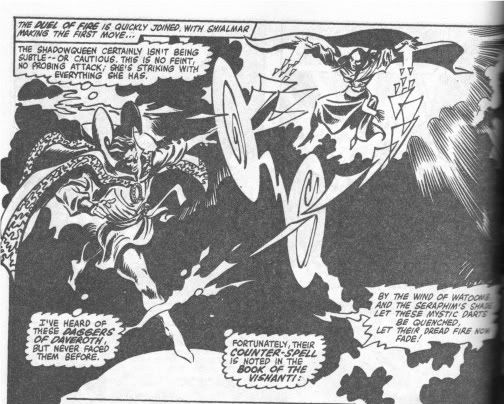Monday, April 26, 2010
Thoughts on Essential Doctor Strange Vol. 4
Essential Doctor Strange Volume 4.
Having never read many issues of Doctor Strange me reviewing this collection is a bit like if I watched a random episode of Deadwood or the Wire or any other program with an ongoing plot I’m unfamiliar with; I can comment on what I saw, but I don’t know the background. So, if I’ve made wrong assumptions please forgive me.
The first thing up for discussion is magic according to the marvel universe. It just seems to be rather uniform. Every spell and counter spell is written in the Book of Vishanti. I’d say that’s pretty convenient. Can’t a learned sorcerer make up new spells? Also, I do not understand why the Vishanti are the most powerful Gods. Doctor Strange in this volume fights Nightmare, the Dweller-in-Darkness and the N’garai, but Strange wins because the Vishanti whom he draws power from just happen to be the most powerful force in all universes and realities. It doesn’t matter if Strange goes through a black mirror and into another dimension or if he travels into Dormammu’s Dark Dimension or Nightmare’s realm, the magic of the Vishanti prevails.
In fact, the magic of the Vishanti appears to be the only magic anywhere. Clea, Strange’s lover, who was the “firstborn of Orini, who is Suzerein to the dread Dormammu, ruler of my home dimension.” (Doctor Strange #45) My assumption would be that being from a dark dimension she would have some kick-ass black magic. I don’t want her to be evil or even a bad person, but it would just open up so many great storylines. Here is my idea: Clea was a bad person in her dimension. It’s not her fault she grew up in the dark dimension and had a skewed moral lessons. When Doctor Strange first came to her dimension and fought Dormammu she had a change of heart. Suddenly here was a man who believed in her and her potential for good when no one else would. She betrays Dormammu, helps Doctor Strange defeat him and then travels with Doctor Strange to his dimension. On Earth, Clea begins to train herself to use her black magic for good. She has powerful spells that she must use carefully in order to not permanently injure opponents. Since Doctor Strange is not familiar with black magic except for counter spells, Clea has much to teach him and in return Strange teaches Clea the magic of the Vishanti.
This idea is unfortunately not the reality of the comics I read, instead Clea is a novice sorceress who is mentoring with Strange. He calls her his protégé even though she seems at times to be a bit of a hopeless case. When she admits that she lacks any self-confidence in her abilities Doctor Strange says he’s never been more sure that she should be his protégé. Strange seems to me to be blinded by his love for her, he’d be better off with almost anyone else as his protégé: what about Illyana Rasputin (aka Magik) Colossus’ sister or heck with his astral projection skills I think Charles Xavier would be a better candidate for Strange’s protégé.
Later in that same issue Strange makes the more obvious attempt to boost Clea’s confidence. He is fighting a N’Garai, an Elder Demon God from another dimension in his basement. The demon has made Wong and two others into his servants and they are attacking Strange and Clea. Strange says “I know of a spell that can defeat this guy, it’s in the Book of Vishanti, I’ll go get it in astral form. You protect my body.” Okay, he is in his basement. All he and Clea have to do is make a strategic retreat upstairs. How is astral form any quicker? It’s not like he’s going to run into rush hour traffic trying to get upstairs in his body. And staying in his body has the advantage of not leaving his body completely helpless. It isn’t as if he knew Clea could handle Wong and the two other, on the page before he was having trouble fighting them. He recklessly risked his own life, his friends lives and probably the whole dimension just because his girlfriend was feeling a little down on herself.
Okay, moving along, so Clea doesn’t have any magic different from the Vishanti, but surely evil sorcerers and sorceresses in other dimensions have some different spells. Nope. When Doctor Strange fights Shialmar ( the self-appointed sorceress supreme in another dimension (issue 44) she throws crystals of Cyndriarr at Strange and he thinks wow that spell is so powerful I haven’t used it, but it’s obviously in the Book of Vishanti because he knows the counter spell. Aren’t there different branches of magic, so that maybe one sorcerer specializes in healing magic and another in dark magic? No, in the Marvel Universe everyone knows every spell because it’s all written in one book.
Speaking of different dimensions why is it that no matter what dimension or realm Doctor Strange finds himself in, the laws of physics are also a constant. I mean I understand that one of the theories of alternate dimensions postulates that the laws of physics would be a constant throughout every dimension in the multiverse and I can accept that. But you’re telling me that the realm of Nightmare or the realm of the Dweller-in-Darkness are basically no different than Earth? That’s boring! I want to see Strange walking or astral projecting through realms beyond my imagination. I want him exploring an M.C. Escher or Salvador Dali inspired world where up is down and down is up. And when he tries to cast Flames of Faltine it causes roses to appear in the hands of his opponents and so he has to cast a spell for roses and then the flames appear.
I know it’s just a comic and it was written for a young adult audience, but doesn’t Doctor Strange make it look insanely easy to be Sorcerer Supreme. He has all the answers in one book. If I’d only had to read one book in order to get my Master’s Degree in Library Science, that would have been sort of fishy right? You’d wonder if I’d be able to perform all my duties. And I’m just a librarian; Doctor Strange is the protector of the Universe!
The other thing that leads me to the conclusion that his job is easy is that he only ever uses a handful of spells. It doesn’t matter if he’s fighting a monster, another sorcerer, or some sort of God like entity, the same couple of spells will always get the job done. Here they are, I bet you can list them with me:
Crimson Bands of Cytorrak
Flames of Faltine
Cloak of Levitation
Agamotto’s Light of Truth
Bolt of Bedevilment
Images of Ikonn
Shield of Seraphim
Despite my complaints, I did enjoy these issues and I’ll try to keep it more positive if and when I comment on individual issues and storylines.
Saturday, April 17, 2010
Thought on "Oath of Fealty"

Oath of Fealty
Originally posted April 12, 2010
http://groups.yahoo.com/group/ClassicScienceFiction/message/17909
"Oath of Fealty" is a good science fiction novel that falls short of being a great science fiction novel. "Fealty is the fourth novel I've read by the team of Larry Niven and Jerry Pournelle. The others being "Lucifer's Hammer," "Footfall," and "Mote in God's Eye." Each of those 3 were undeniably brilliant. They were real page-turners that explored fascinating new worlds and new ideas. They had exciting characters and situations. This novel, written in-between "Lucifer" and "Footfall" just doesn't measure up.
The world of the story is: in the near future, about 20 years ago, just outside of Los Angeles a huge arcology called Todos Santos has been built. If you don't know what an arcology is don't feel bad. I had to read the description is Wikipedia too. Here is a link: http://en.wikipedia.org/wiki/Arcology
This behemoth structure comfortably houses half a million people. Most of the residents never leave the structure which has everything from parks, to shops to restaurants, hospitals and funeral homes. But many of the people of Los Angeles resent this new city, they resent it's tax exemptions, they resent it's residents living in comfort while they're still poor. Many environmental groups are also against such structures because they believe they use too many natural resources to sustain them. One such group, the FROMATES has resorted to terrorist acts against arcologies in the past.
The characters in the novel are one of the weak points, there's no real protagonist which is okay if enough of the characters are fleshed out so that it feels like there are multiple protagonists. This was done effectively in "Footfall and "Lucifer's Hammer." In this novel you have a bunch of possibly interesting characters that you are never really given the chance to get to know. All you get is a glimpse. Maybe it was the length of the story that was the problem. The other Niven/Pournelle novels I've read were around 500 pages, this ones only 324.
The Plot
You're rolling along reading about this world and exploring the arcology for about 70 pages and just when you're starting to wonder when it's going to get good, Boom! the plot hits. There are terrorists inside Todos Santos. They're about the reach the hydrogen tanks. They could destroy the city. We see how tense the mood in the Todos situation room is. Preston Sanders, the second-in-command is forced to decide in his boss' place. He orders deadly gas vented into the chamber where the terrorists are. However, it turns out the so called terrorists were teens with sophisticated electrical equipment, but a box full of sand not explosives. And so Sanders is arrested and prosecuted by the Los Angeles DA because there is a question as to whether Sanders acted too rashly.
This situation was interesting because I felt like the social norms regarding terrorism have changed since this novel was written in 1981. What was clearly an ambiguous moral situation back then would be cut and dry today. Due to the rise in terrorist attacks and school shootings (since the 1999 Columbine Attack), we (America) just don't mess around anymore. I can't see anyone in Los Angeles defending the teens actions. The thinking would be, "if you act like a terrorist expect to be treated as one."
Security
There is an omnipresent security force in Todos Santos. However there is no reason to be afraid of them because there are bizarrely no courts or jails in Todos, that being one of the main points of the story that they are still under Los Angeles legal jurisdictions. This didn't really make any sense
to me.
Rather than being afraid of this ever present security force in some sort of "1984" like way, the citizens of Todos think of security as their friends. The citizen's thinking is summed up nicely in the memorable sequence of the toilet paper rope. The kids in Todos sometimes string toilet paper rope over Todos' high speed moving platforms. Only tourists duck, Todos citizens believe if it was anything that could hurt them security would stop it. The citizen believe that since security is always watching they are protected. However we learn in one of the first chapters that security watches the citizens randomly so many incidents are likely to go unnoticed, so anyone depending on security to protect them should eventually be hurt or killed.
I don't think this feeling of complete safeness is healthy at all. What about when they leave Todos, they are likely to forget they aren't in Todos and get hurt or killed by a mugger or something. And as I mentioned before even in Todos they aren't really safe, they just feel safe.
The Newsman
One of the more enigmatic characters in the novel is Thomas Lunan, a TV news reporter that focuses on the big picture story of what life is like in Todos Santos and what kind of a culture has developed in this new society. Rather than the obvious story most reporters are focused on, the terrorism story.
At one point Lunan makes a documentary about Todos Santos and talks about how safe Todos is compared to Los Angeles. He contrasts light- hearted scenes of Todos security watching over it's citizens, walking a drunk man home, helping a teen locate her father; with a scene of Lunan's own neighborhood in Los Angeles. Lunan parks his expensive car in a seemingly falling apart garage and walks several blocks to his apartment where all of his nice possessions are similarly camouflaged in a seemingly run down building. However, it doesn't seem to dawn on Lunan that he just put a video on TV which explains exactly how to rob him! One of the other characters notices this while watching the documentary and quips "he better be moving tomorrow." But sadly, you find out later that the night the documentary aired Lunan was in his apartment entertaining a lady friend. He's really lucky he didn't get them both killed.
Later on, Lunan participates in a jail break organized by the Todos top-brass even though he knows he can never do a story on it or even ever talk about it. Why would he do that? I could buy that the Todos story changed him, but at the end of the novel Lunan makes it clear that he is still a newsman and wouldn't want to live in Todos.
Second Attack
The novel features a second terrorist attack on Todos, which though this time the terrorists are clearly a threat, it never gripped me the way the first attack did because it felt like just more of the same. I think the second attack should have been something different instead of another scene of terrorists crawling through some sort of maintenance shaft towards hydrogen tanks again. Why didn't the terrorists strike unexpectedly in the city's mall or a crowded restaurant?
The Ending
It seemed as if all the plot threads were wrapped up about 20 pages before the end of the novel and I actually put the book down for an evening thinking,"20 pages of epilogue, boring." but it turns out the book redeems itself, Niven and Pournelle still had a curveball, the last 20 pages were quite good.
Basically, for the whole novel the leaders of Todos are forced to decide whether they are going to become exactly what Los Angeles, Thomas Lunan, and the FROMATES accuse them of being, a nation state, a castle, a new independent civilization. And in the end Todos decides to stay a part of the larger world, it's an optimistic ending, but it works.
Originally posted April 12, 2010
http://groups.yahoo.com/group/ClassicScienceFiction/message/17909
"Oath of Fealty" is a good science fiction novel that falls short of being a great science fiction novel. "Fealty is the fourth novel I've read by the team of Larry Niven and Jerry Pournelle. The others being "Lucifer's Hammer," "Footfall," and "Mote in God's Eye." Each of those 3 were undeniably brilliant. They were real page-turners that explored fascinating new worlds and new ideas. They had exciting characters and situations. This novel, written in-between "Lucifer" and "Footfall" just doesn't measure up.
The world of the story is: in the near future, about 20 years ago, just outside of Los Angeles a huge arcology called Todos Santos has been built. If you don't know what an arcology is don't feel bad. I had to read the description is Wikipedia too. Here is a link: http://en.wikipedia.org/wiki/Arcology
This behemoth structure comfortably houses half a million people. Most of the residents never leave the structure which has everything from parks, to shops to restaurants, hospitals and funeral homes. But many of the people of Los Angeles resent this new city, they resent it's tax exemptions, they resent it's residents living in comfort while they're still poor. Many environmental groups are also against such structures because they believe they use too many natural resources to sustain them. One such group, the FROMATES has resorted to terrorist acts against arcologies in the past.
The characters in the novel are one of the weak points, there's no real protagonist which is okay if enough of the characters are fleshed out so that it feels like there are multiple protagonists. This was done effectively in "Footfall and "Lucifer's Hammer." In this novel you have a bunch of possibly interesting characters that you are never really given the chance to get to know. All you get is a glimpse. Maybe it was the length of the story that was the problem. The other Niven/Pournelle novels I've read were around 500 pages, this ones only 324.
The Plot
You're rolling along reading about this world and exploring the arcology for about 70 pages and just when you're starting to wonder when it's going to get good, Boom! the plot hits. There are terrorists inside Todos Santos. They're about the reach the hydrogen tanks. They could destroy the city. We see how tense the mood in the Todos situation room is. Preston Sanders, the second-in-command is forced to decide in his boss' place. He orders deadly gas vented into the chamber where the terrorists are. However, it turns out the so called terrorists were teens with sophisticated electrical equipment, but a box full of sand not explosives. And so Sanders is arrested and prosecuted by the Los Angeles DA because there is a question as to whether Sanders acted too rashly.
This situation was interesting because I felt like the social norms regarding terrorism have changed since this novel was written in 1981. What was clearly an ambiguous moral situation back then would be cut and dry today. Due to the rise in terrorist attacks and school shootings (since the 1999 Columbine Attack), we (America) just don't mess around anymore. I can't see anyone in Los Angeles defending the teens actions. The thinking would be, "if you act like a terrorist expect to be treated as one."
Security
There is an omnipresent security force in Todos Santos. However there is no reason to be afraid of them because there are bizarrely no courts or jails in Todos, that being one of the main points of the story that they are still under Los Angeles legal jurisdictions. This didn't really make any sense
to me.
Rather than being afraid of this ever present security force in some sort of "1984" like way, the citizens of Todos think of security as their friends. The citizen's thinking is summed up nicely in the memorable sequence of the toilet paper rope. The kids in Todos sometimes string toilet paper rope over Todos' high speed moving platforms. Only tourists duck, Todos citizens believe if it was anything that could hurt them security would stop it. The citizen believe that since security is always watching they are protected. However we learn in one of the first chapters that security watches the citizens randomly so many incidents are likely to go unnoticed, so anyone depending on security to protect them should eventually be hurt or killed.
I don't think this feeling of complete safeness is healthy at all. What about when they leave Todos, they are likely to forget they aren't in Todos and get hurt or killed by a mugger or something. And as I mentioned before even in Todos they aren't really safe, they just feel safe.
The Newsman
One of the more enigmatic characters in the novel is Thomas Lunan, a TV news reporter that focuses on the big picture story of what life is like in Todos Santos and what kind of a culture has developed in this new society. Rather than the obvious story most reporters are focused on, the terrorism story.
At one point Lunan makes a documentary about Todos Santos and talks about how safe Todos is compared to Los Angeles. He contrasts light- hearted scenes of Todos security watching over it's citizens, walking a drunk man home, helping a teen locate her father; with a scene of Lunan's own neighborhood in Los Angeles. Lunan parks his expensive car in a seemingly falling apart garage and walks several blocks to his apartment where all of his nice possessions are similarly camouflaged in a seemingly run down building. However, it doesn't seem to dawn on Lunan that he just put a video on TV which explains exactly how to rob him! One of the other characters notices this while watching the documentary and quips "he better be moving tomorrow." But sadly, you find out later that the night the documentary aired Lunan was in his apartment entertaining a lady friend. He's really lucky he didn't get them both killed.
Later on, Lunan participates in a jail break organized by the Todos top-brass even though he knows he can never do a story on it or even ever talk about it. Why would he do that? I could buy that the Todos story changed him, but at the end of the novel Lunan makes it clear that he is still a newsman and wouldn't want to live in Todos.
Second Attack
The novel features a second terrorist attack on Todos, which though this time the terrorists are clearly a threat, it never gripped me the way the first attack did because it felt like just more of the same. I think the second attack should have been something different instead of another scene of terrorists crawling through some sort of maintenance shaft towards hydrogen tanks again. Why didn't the terrorists strike unexpectedly in the city's mall or a crowded restaurant?
The Ending
It seemed as if all the plot threads were wrapped up about 20 pages before the end of the novel and I actually put the book down for an evening thinking,"20 pages of epilogue, boring." but it turns out the book redeems itself, Niven and Pournelle still had a curveball, the last 20 pages were quite good.
Basically, for the whole novel the leaders of Todos are forced to decide whether they are going to become exactly what Los Angeles, Thomas Lunan, and the FROMATES accuse them of being, a nation state, a castle, a new independent civilization. And in the end Todos decides to stay a part of the larger world, it's an optimistic ending, but it works.
Subscribe to:
Posts (Atom)



